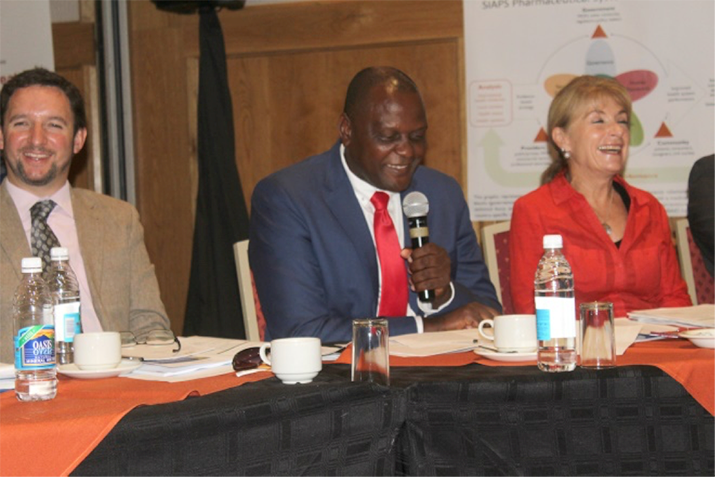Building a Resilient Pharmaceutical System: SIAPS Event Highlights its Work in Namibia
Building a Resilient Pharmaceutical System: SIAPS Event Highlights its Work in Namibia

The USAID-funded Systems for Improved Access to Pharmaceuticals and Services (SIAPS) Program wrapped up its years of work in Namibia with an event in Windhoek on March 14.
The program has worked in the country since 2011 to strengthen pharmaceutical management, helping to improve access to quality-assured medicines and related skilled services. SIAPS’ activities focused on enhancing pharmaceutical service delivery, health workforce availability, information systems, financing, leadership, and governance.
Leaders from a number of organizations spoke on SIAPS’ work and results. The program contributed significantly to improving patient treatment for HIV and TB, as well as thwarting the growing threat of antimicrobial resistance (AMR) in the treatment of both diseases.
Dr. Bernard Haufiku, Namibia’s Minister of Health and Social Services, said, “We are beginning to face the growing challenge of ensuring patients adhere to their ARV treatment and that they are retained in care…[SIAPS] looked at the pharmaceutical system in its entirety to implement services to address those gaps.
“Stronger pharmacovigilance has contributed to the continued safety of patients on HIV and TB treatment. Adherence tracking and retention in HIV care has improved; indicators for HIV drug resistance have been institutionalized. The use of standard treatment guidelines in clinical practice and in training is gaining momentum.”
He noted that more than 80 main ART sites are now using the SIAPS-supported Electronic Dispensing Tool for ARV dispensing and ART patient pharmacy services management. He also noted the improved visibility of pharmaceutical and ART data through the use of a Pharmaceutical Information Dashboard implemented at over 50 health facilities countrywide.
Robert Rhodes, USAID’s Acting Country Representative in Namibia, discussed the need for skilled pharmacy workers to handle the increasing burden of HIV, TB, malaria, and other diseases in Namibia. In response, SIAPS worked closely with the Pharmacy Council and the Health Professions Council of Namibia to streamline the registration and licensing of pharmacy practitioners in the country.
“The pharmaceutical sector is a critical component of the national HIV response to reach the 90-90-90 goals. More pharmaceutical personnel are needed to make antiretroviral treatment services available to patients. This is true in both rural and urban settings with a high dispensing workload. [SIAPS] played a key role in the establishment of the Namibia Pharmacy School for the training of pharmacists. It also helped the National Health Training Center shape the curriculum for the training of pharmacist assistants to suit Namibia’s current needs in pharmacy. This support was crucial to alleviate the pharmaceutical human resource challenges faced by Namibia’s health care system,” Rhodes said.
Rhodes also spoke of SIAPS’s work in furthering development of electronic information systems, such as the pharmaceutical management information dashboard. “Modern pharmaceutical systems are data-driven. They must have the capacity to collect, analyze, and use information for both clinical and programmatic decisions. In this regard, PEPFAR, through the SIAPS Project, supported the Ministry to develop and implement innovative data analysis tools to improve pharmaceutical management, inventory management, patient-service delivery, and medicines safety monitoring.”
Dr. Evans Sagwa, SIAPS Country Director in Namibia, gave an overview of the program’s work. Among other activities:
- The program assisted the Namibian Medicines Regulatory Council in strengthening its systems for medicine registration, quality assurance, and safety monitoring, including implementing Pharmadex, a web-based applications processing tool.
- It assisted in developing a national AMR agenda and action plan.
- It developed a facility electronic stock card to help health facilities manage pharmaceutical inventories.
- SIAPS supported pharmacovigilance activities, which enhanced reporting on adverse drug reactions, analysis, and informing health workers and policy makers.
- Support was also provided to review the National Medicines Policy and to update the Namibian Essential Medicines List.